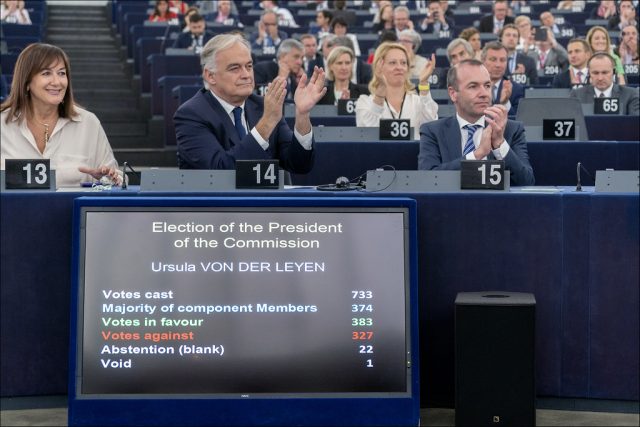
Finally Mrs. Von der Leyen delivered her second mandate statement and she got elected by a majority EPP-liberal-socialist consensus in the 2024 European Parliament. But what did she exactly say, what awaits us after five years of European impoverishment?
Let us leave aside for one minute her weak rhetoric and persuasive skills, where she congratulates her friend “Roberta” from the bottom of her heart and she repeats “honourable members” twenty times. If Lady Thatcher had not invented the term “Mickey Mouse Parliament”, we should certainly think that we are in Disney World and not in a political institution.
The first idea that comes out of speech is a “stronger Europe”. This is already worrying in the lips of the federalists she is being backed by. Though disguised behind a need for defense and democracy, it is fact an excuse for the invasion of further national competences.
What about the Green Deal? The verb chosen to manage it cannot be less satisfying: “sticking” to it is what we need, according to the then candidate. Albeit sticking with pragmatism. Can there be a clearer contradictio in terminis? How can one stick to the Green Deal with pragmatism, if the Grean Deal is the very opposition to reality.
Fortunately, the German politician accommodates “competitiveness” quite at the top of her discourse. A Vice-President will coordinate burden reduction; however, we need to stay vigilant, as this appeal to competitiveness should not be to the detriment of medium, small and family enterprises and to the sole benefit of global friends of Von der Leyen, Macron and the like.
In the first 100 days, she commits to put in place a new deal, this time a “Clean Industrial Deal”. We have no clue what this plan will be or whether it is already on course or else will be improvised. For sure, again it will not be a deal, as this is defined by the Oxford dictionary as an agreement, and this is rather a top-down approach, typical of a planned economy which in history we have known with the example of the five-year plans of the Soviet Union.
Then she goes on to propose a “European Savings and Investments Union” so that savings and investments coming from Europe do not go abroad. However, once again we are not told how she wishes to make this statement true, as investments by definition go where savers think they are safer and more profitable. Mrs. Von der Leyen does not speak either of financial risk or profitability, not one single word.
An example of how this unelected official tries to centralise power is her call to double Europol’s staff and strengthen its mandate. She wants Europol to become a “truly” operational police agency; but the principle of subsidiarity says otherwise. The defense of citizens happens mainly at neighbourhood level. Where is the impact assessment that demonstrates there is a need for the Commission to spend double our money to a protection force that is so far from streets and houses?
Migration is perhaps the only point where she strikes right, and this just because she was obliged to due to the vast majority of Parliament having agreed so at the end of the last mandate. This is a true deal, but not belonging to her vision. Naturally, she now needs to develop. Let us hope that the solidarity that she has nevertheless managed to sneak in her statement does not serve her and liberal national governments to break holes into the protective walls of Frontex.
Finally, farmers come to as a thirteenth priority to Queen Ursula, as she is by now being nicknamed. She tells them that she will present a new European strategy for our agriculture and the food sector; but she warns them with their typical little words: the EU under her command will reward “anyone who manages nature and biodiversity in a sustainable way and helps to balance the carbon budget”. We know what that has meant for our farmers in the past and we fear what it will continue to mean if she is not told off.
Source of image: Flickr



 Subscribe
Subscribe